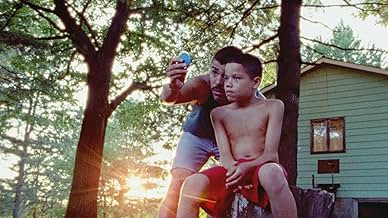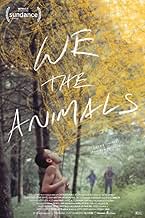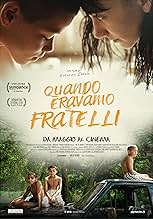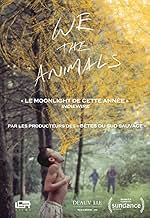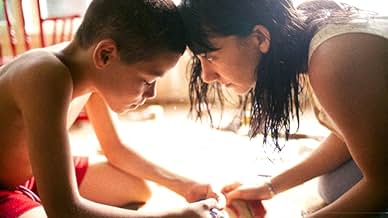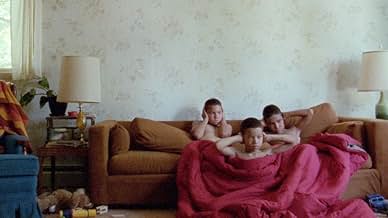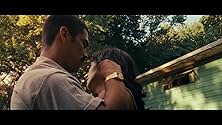IMDb रेटिंग
6.9/10
4.7 हज़ार
आपकी रेटिंग
अपनी भाषा में प्लॉट जोड़ेंManny, Joel, and Jonah tear their way through childhood and push against the volatile love of their parents. As Manny and Joel grow into versions of their father and Ma dreams of escape, Jon... सभी पढ़ेंManny, Joel, and Jonah tear their way through childhood and push against the volatile love of their parents. As Manny and Joel grow into versions of their father and Ma dreams of escape, Jonah embraces an imagined world all on his own.Manny, Joel, and Jonah tear their way through childhood and push against the volatile love of their parents. As Manny and Joel grow into versions of their father and Ma dreams of escape, Jonah embraces an imagined world all on his own.
- निर्देशक
- लेखक
- स्टार
- पुरस्कार
- 12 जीत और कुल 32 नामांकन
Josiah Gabriel Santiago
- Joel
- (as Josiah Gabriel)
Ruy García
- Pentecostal televangelist
- (बिना क्रेडिट के)
फ़ीचर्ड समीक्षाएं
WE THE ANIMALS lulls you into thinking it's a mere memory piece. Much of the film is made up of short scenes that are more snatches in time, than anything resembling a tight narrative. Jeremiah Zagar's debut film follows three young Hispanic boys as they grow up in the 80s in upper state New York - Manny, Joel and Jonah (Evan Rosado; who also narrates). Their parents Ma (Sheila Vand) and Paps (Raul Castillo) struggle not only with making ends meet, but, also in their volatile relationship. Although the family has moved from NYC to the more bucolic rural suburbs, their move isn't necessarily a happy one.
While the film may seem formless at times, the vibrantly shot and directed segments (lots of hand-held; grainy earthy 16mm film stock), accumulate over the course of the movie. A flashback might just seem like a fuzzy thought when it passes by earlier in the film, but, pays off later. Zagar's stylistic touches don't always work. Jonah's drawings in a sketch book get animated at certain points in the film, but, never really feel all too well integrated. What does emerge is a larger picture of a family battling both within and without. Paps' macho Latino father dominates not only the mother, but, also causes frissons within the trio of brothers.
WE THE ANIMALS can be taken as simply a flashback reminiscence (it's based on a memoir by Justin Torres), but, once you let it roll over in your mind, a more complete 'story' takes hold. And, it it's a powerful one. Zagar's film is a refreshing, if at times, painful feature.
While the film may seem formless at times, the vibrantly shot and directed segments (lots of hand-held; grainy earthy 16mm film stock), accumulate over the course of the movie. A flashback might just seem like a fuzzy thought when it passes by earlier in the film, but, pays off later. Zagar's stylistic touches don't always work. Jonah's drawings in a sketch book get animated at certain points in the film, but, never really feel all too well integrated. What does emerge is a larger picture of a family battling both within and without. Paps' macho Latino father dominates not only the mother, but, also causes frissons within the trio of brothers.
WE THE ANIMALS can be taken as simply a flashback reminiscence (it's based on a memoir by Justin Torres), but, once you let it roll over in your mind, a more complete 'story' takes hold. And, it it's a powerful one. Zagar's film is a refreshing, if at times, painful feature.
I really hope this film gets the audience and recognition it deserves. I was so blown away by the cinematography and score that I had to really think afterwards about just how good the acting was too. Flawless performances by all, not least of which the three boys who you would assume are brothers in real life (they're not).
Bravo, well done!
Bravo, well done!
I wasn't sure what to expect from this film, but it turned out to remind me of two masterpieces- Moonlight and The Tree of Life. Its camerawork is sometimes reminiscent of Malick and the flowing, dreamy-like atmosphere he creates, but the narrative is also sometimes very much in the structure of Moonlight. Regardless, it's a fantastic film filled with fantastic performances that deserves to be seen.
I lived parts of this story. My parents have a toxic marriage. My Dad is mentally ill and was abusive. He has bipolar. My childhood felt so free at times, like this kid, but as I got older I realized how trapped I was. I'm 27 now, free enough of my childhood, but the memories always linger. Watching this was painful, but sometimes you ave to acknowledge what happened.
A remarkably contained and intimate story featuring only five main cast members and around ten locations, We the Animals is about a young boy awakening to the fact that he's homosexual. Equal parts disassociated lyricism and warts-and-all grittiness, the film looks at how the crystallising of one's perception of the world goes hand-in-hand with a loss of innocence. Less concerned with narrative beats and character arcs than with tone and impressionistic visual poetry, the film operates in a similar magical realist key as Benh Zeitlin's masterful Beasts of the Southern Wild (2012), whilst also calling to mind the Texas scenes of Terrence Malick's opus The Tree of Life (2011), especially in the whispery pronouncements of the voiceover narration. Mixing nostalgia, idealism, recrimination, anger, personal freedom, and the constant conflict between optimism and experience into a potent whole, whilst the narrative could be accused of being a little insubstantial, We the Animals is an effective and poignant evocation of the modulations of childhood.
Set in upstate New York in the 1990s, the film tells the story of nine-year-old Jonah (Evan Rosado), who lives with his Ma (Sheila Vand) and Paps (Raúl Castillo), and two slightly older brothers, Manny (Isaiah Kristian) and Joel (Josiah Gabriel Santiago). Existing just above the poverty line, the family is tightly-knit but dysfunctional, with Ma and Jonah especially close. Married when they were still teenagers, both Ma and Paps possess violent tempers, which often leads to arguments that become physical. As time passes, Jonah begins to notice how much more contemplative and wistful he is than his siblings. When a neighbouring boy shows the brothers a porn movie, Jonah is taken aback when he reacts more strongly to a brief clip of two men having sex than anything else in the video. And so he must attempt to navigate something he doesn't understand and can't articulate, in a milieu built on rugged heterosexual masculinity.
We the Animals is the fiction film debut of documentarian Jeremiah Zagar, and was written for the screen by Zagar and Daniel Kitrosser, from Justin Torres's semi-autobiographical 2011 novel of the same name. And although the film changes some aspects (the three brothers are unnamed in the novel, for example, whilst the protagonist's first homosexual experienced is far more graphic than in the film), it remains a remarkably authentic adaptation, capturing both the tone and texture of Torres's prose. And much like the novel, rather than presenting a classically structured plot with forward momentum, the film is instead composed of vignettes presented in a broadly chronological manner. Essentially a bildungsroman, in its depiction of a young boy struggling to understand why he feels so different to those around him, it covers some of the same thematic ground as Moonlight (2016), albeit with a more esoteric tone. In a similar manner, although its depiction of the three brothers' mischief recalls The Florida Project (2017), We the Animals is far more lyrical and existentialist.
Aesthetically, there's a lot to admire here. Zagar's documentarian background is especially noticeable in his use of the techniques of cinéma vérité; scenes of the brothers chasing one another through long grass, for example, weren't blocked, but were improvised on location by the performers, with cinematographer Zak Mulligan simply following along behind the actors with a Steadicam, reacting to their spontaneous movement, and giving the film a sense of being unmediated. In another stylistic choice, the film initially presents the boys as relatively indistinguishable from one another. However, at about the half-way point, this begins to change, as Jonah starts to become aware that he isn't like his brothers, and so begins to withdraw from them, first ideologically, then physically.
In tandem with this, the voiceover narration becomes less and less frequent. Tied into this are Jonah's crayon pictures. As he struggles to process the realities of sex, violence, and his increasingly fraught family life, the nature of the images begins to change; from relatively innocent doodling to images that are far more sexualised and violent. Also important here is how well Zagar uses the mise en scène to suggest psychology. In the early parts of the film, equal screentime is given to shots of Jonah under his bed drawing and shots of him huddled with his brothers in a blanket fashioned like a tent. However, as the film progresses, we see less and less of him in the tent, and more under the bed, something which carries huge thematic importance for the penultimate scene.
In terms of focalisation, the film is tied rigidly to Jonah's perspective throughout, never allowing the audience access to anything that he himself doesn't explicitly see or hear. In a general sense, this can be seen in the frequency with which Mulligan places his camera at Jonah's eye level. A more specific example involves a scene when Paps is arguing with another man off-camera. We can hear the voices and make out the odd word, but we can't clearly hear all that is said, because neither can Jonah. It's an extremely effective use of off-screen space. Also important in this sense is that the film is shot on very grainy Super 16, predominately with wide lenses and a shallow depth of field, robbing the images of sheen and depth, and thus foregrounding the impreciseness of memory; it is as if we are looking at events through gauze, half-remembered and half-embellished, a formalism that doesn't distinguish between past and present, reminding me a little of Andrei Tarkovsky's The Mirror (1975) and Terence Davies's Distant Voices, Still Lives (1988) (for my money, the best representations of memory ever put on film).
Thematically, although the story would seem to lend itself to socio-political commentary, Zagar is relatively uninterested in anything beyond Jonah's immediate experience; so if Jonah is unaware of how homosexuals are perceived in the country at large, then such information cannot be presented in the film. However, there are some undeniable thematic undercurrents. For example, when we are first introduced to Ma and Paps, they seem blissfully in love, but this image is shattered shortly afterwards when we see Paps's temper. However, it soon becomes apparent that he isn't the sole purveyor of violence - when he arrives home with a truck of which Ma disapproves, she slaps him several times and verbally berates him. We also see her snap at the children on several occasions, something we never see Paps doing. However, none of this is to excuse his violence or his attempts to downplay it; after splitting her lip during one argument, he tells the boys that he'd been "punching on her a little".
Some of the dialogue is also achingly beautiful, but underneath the poetry, there are darker implications. When Jonah sees a light bulb in a metal cage, he asks Pa "why is that light in a cage?", to which Pa answers, "so it doesn't fly away." Another example sees Ma tell Jonah that when children are 10, they leave their parents, asking him, "promise me you'll stay mine forever." When he asks "how," she states, "simple; you're not 10, you're 9+1". There's a beauty to this sentiment, but so too is there something unhealthy about it; in one sense she's denying him agency, and in another, she's making him feel guilt for something in his future. Either way, it's not great parenting.
In terms of problems, for all its lyricism, the film never really says anything new, and it suffers in comparison to masterworks such as Tree of Life and Beasts of the Southern Wild. Another issue is that whilst the sense of place is magnificently handled, there is a sense that we are never really allowed into the characters' cores, even Jonah, with Zagar more interested in lyricism that emotion; in trying to convey Jonah's interiority through abstract visual poetry, Zagar neglects the issue of emotional realism. This should be a heartbreaking film, but it isn't, mainly because the characters exist primarily to facilitate philosophical musing, rather than as unique entities in themselves.
That aside, however, We the Animals is a superbly realised film and an impressive debut. Dealing with issues of masculinity, domestic violence, homosexuality, and the discovery of self in a milieu not predisposed to accepting a self which deviates from normative societal doctrine, it's very much focused on the impressionistic and chaotic nature of memory. Depicting a young life yet to be fully formed, the film's inconclusive ending is vital - life doesn't have a three-act structure that simply ends with the closing credits. Things are far more complicated than that. And this might be the film's crowning achievement; in a story ostensibly about the past and how we access it, the final impression with which it leaves us is that we can never know what lies in our future.
Set in upstate New York in the 1990s, the film tells the story of nine-year-old Jonah (Evan Rosado), who lives with his Ma (Sheila Vand) and Paps (Raúl Castillo), and two slightly older brothers, Manny (Isaiah Kristian) and Joel (Josiah Gabriel Santiago). Existing just above the poverty line, the family is tightly-knit but dysfunctional, with Ma and Jonah especially close. Married when they were still teenagers, both Ma and Paps possess violent tempers, which often leads to arguments that become physical. As time passes, Jonah begins to notice how much more contemplative and wistful he is than his siblings. When a neighbouring boy shows the brothers a porn movie, Jonah is taken aback when he reacts more strongly to a brief clip of two men having sex than anything else in the video. And so he must attempt to navigate something he doesn't understand and can't articulate, in a milieu built on rugged heterosexual masculinity.
We the Animals is the fiction film debut of documentarian Jeremiah Zagar, and was written for the screen by Zagar and Daniel Kitrosser, from Justin Torres's semi-autobiographical 2011 novel of the same name. And although the film changes some aspects (the three brothers are unnamed in the novel, for example, whilst the protagonist's first homosexual experienced is far more graphic than in the film), it remains a remarkably authentic adaptation, capturing both the tone and texture of Torres's prose. And much like the novel, rather than presenting a classically structured plot with forward momentum, the film is instead composed of vignettes presented in a broadly chronological manner. Essentially a bildungsroman, in its depiction of a young boy struggling to understand why he feels so different to those around him, it covers some of the same thematic ground as Moonlight (2016), albeit with a more esoteric tone. In a similar manner, although its depiction of the three brothers' mischief recalls The Florida Project (2017), We the Animals is far more lyrical and existentialist.
Aesthetically, there's a lot to admire here. Zagar's documentarian background is especially noticeable in his use of the techniques of cinéma vérité; scenes of the brothers chasing one another through long grass, for example, weren't blocked, but were improvised on location by the performers, with cinematographer Zak Mulligan simply following along behind the actors with a Steadicam, reacting to their spontaneous movement, and giving the film a sense of being unmediated. In another stylistic choice, the film initially presents the boys as relatively indistinguishable from one another. However, at about the half-way point, this begins to change, as Jonah starts to become aware that he isn't like his brothers, and so begins to withdraw from them, first ideologically, then physically.
In tandem with this, the voiceover narration becomes less and less frequent. Tied into this are Jonah's crayon pictures. As he struggles to process the realities of sex, violence, and his increasingly fraught family life, the nature of the images begins to change; from relatively innocent doodling to images that are far more sexualised and violent. Also important here is how well Zagar uses the mise en scène to suggest psychology. In the early parts of the film, equal screentime is given to shots of Jonah under his bed drawing and shots of him huddled with his brothers in a blanket fashioned like a tent. However, as the film progresses, we see less and less of him in the tent, and more under the bed, something which carries huge thematic importance for the penultimate scene.
In terms of focalisation, the film is tied rigidly to Jonah's perspective throughout, never allowing the audience access to anything that he himself doesn't explicitly see or hear. In a general sense, this can be seen in the frequency with which Mulligan places his camera at Jonah's eye level. A more specific example involves a scene when Paps is arguing with another man off-camera. We can hear the voices and make out the odd word, but we can't clearly hear all that is said, because neither can Jonah. It's an extremely effective use of off-screen space. Also important in this sense is that the film is shot on very grainy Super 16, predominately with wide lenses and a shallow depth of field, robbing the images of sheen and depth, and thus foregrounding the impreciseness of memory; it is as if we are looking at events through gauze, half-remembered and half-embellished, a formalism that doesn't distinguish between past and present, reminding me a little of Andrei Tarkovsky's The Mirror (1975) and Terence Davies's Distant Voices, Still Lives (1988) (for my money, the best representations of memory ever put on film).
Thematically, although the story would seem to lend itself to socio-political commentary, Zagar is relatively uninterested in anything beyond Jonah's immediate experience; so if Jonah is unaware of how homosexuals are perceived in the country at large, then such information cannot be presented in the film. However, there are some undeniable thematic undercurrents. For example, when we are first introduced to Ma and Paps, they seem blissfully in love, but this image is shattered shortly afterwards when we see Paps's temper. However, it soon becomes apparent that he isn't the sole purveyor of violence - when he arrives home with a truck of which Ma disapproves, she slaps him several times and verbally berates him. We also see her snap at the children on several occasions, something we never see Paps doing. However, none of this is to excuse his violence or his attempts to downplay it; after splitting her lip during one argument, he tells the boys that he'd been "punching on her a little".
Some of the dialogue is also achingly beautiful, but underneath the poetry, there are darker implications. When Jonah sees a light bulb in a metal cage, he asks Pa "why is that light in a cage?", to which Pa answers, "so it doesn't fly away." Another example sees Ma tell Jonah that when children are 10, they leave their parents, asking him, "promise me you'll stay mine forever." When he asks "how," she states, "simple; you're not 10, you're 9+1". There's a beauty to this sentiment, but so too is there something unhealthy about it; in one sense she's denying him agency, and in another, she's making him feel guilt for something in his future. Either way, it's not great parenting.
In terms of problems, for all its lyricism, the film never really says anything new, and it suffers in comparison to masterworks such as Tree of Life and Beasts of the Southern Wild. Another issue is that whilst the sense of place is magnificently handled, there is a sense that we are never really allowed into the characters' cores, even Jonah, with Zagar more interested in lyricism that emotion; in trying to convey Jonah's interiority through abstract visual poetry, Zagar neglects the issue of emotional realism. This should be a heartbreaking film, but it isn't, mainly because the characters exist primarily to facilitate philosophical musing, rather than as unique entities in themselves.
That aside, however, We the Animals is a superbly realised film and an impressive debut. Dealing with issues of masculinity, domestic violence, homosexuality, and the discovery of self in a milieu not predisposed to accepting a self which deviates from normative societal doctrine, it's very much focused on the impressionistic and chaotic nature of memory. Depicting a young life yet to be fully formed, the film's inconclusive ending is vital - life doesn't have a three-act structure that simply ends with the closing credits. Things are far more complicated than that. And this might be the film's crowning achievement; in a story ostensibly about the past and how we access it, the final impression with which it leaves us is that we can never know what lies in our future.
क्या आपको पता है
- ट्रिवियाBased on the novel 'We The Animals' by Justin Torres, a semi-autobiographical story of the authors life growing up in rural Upstate New York.
- गूफ़The movie takes place in the 1980s. But when the boys shoplift at the convenience store, the Visa logo displayed at the store entrance is the one which first went into use in the 2000s.
- कनेक्शनReferenced in Chambre 212 (2019)
टॉप पसंद
रेटिंग देने के लिए साइन-इन करें और वैयक्तिकृत सुझावों के लिए वॉचलिस्ट करें
- How long is We the Animals?Alexa द्वारा संचालित
विवरण
बॉक्स ऑफ़िस
- US और कनाडा में सकल
- $4,00,961
- US और कनाडा में पहले सप्ताह में कुल कमाई
- $63,357
- 19 अग॰ 2018
- दुनिया भर में सकल
- $4,34,743
- चलने की अवधि1 घंटा 34 मिनट
- रंग
- पक्ष अनुपात
- 2.35 : 1
इस पेज में योगदान दें
किसी बदलाव का सुझाव दें या अनुपलब्ध कॉन्टेंट जोड़ें








